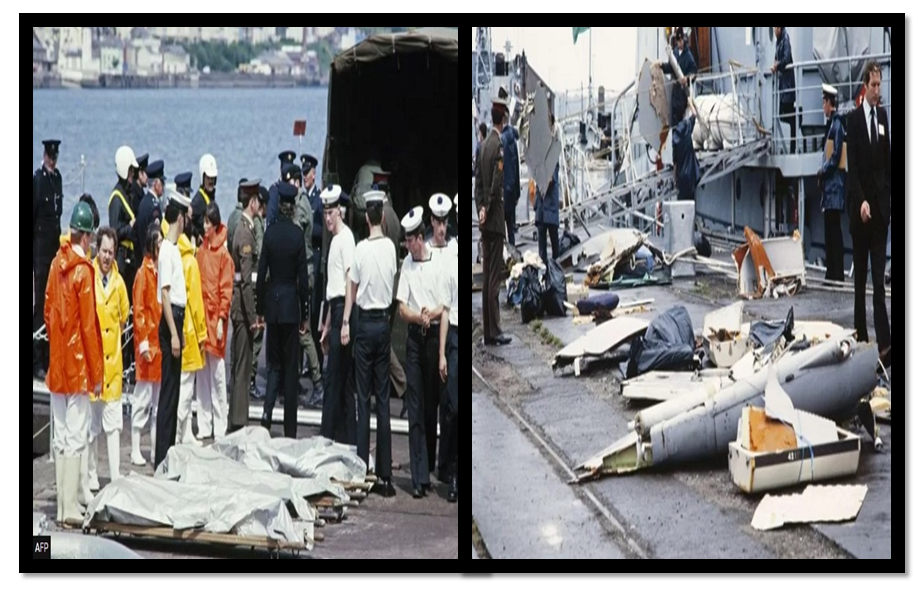Cork: Irish people will gather again today to remember the hundreds of people of Indian descent who lost their lives at the hands of terrorists. On this day 38 years ago, the world’s second-largest aviation disaster occurred. On June 23, 1985, an Air India Boeing Kanishka crashed into the Atlantic Ocean near Cork, in the south of Ireland.
Khalistani terrorists blew up the plane with a bomb.
329 people, including the crew, were killed. Later reports confirmed that many people died from drowning rather than explosions or plane crashes. There were 280 Canadians among the passengers. The majority of them were of Indian origin. 82 people were children.
Except for the September 2001 World Trade Centre attack, it is regarded as the world’s worst terrorist attack. It is the largest mass shooting in Canada’s history. The plane bombing occurred less than an hour after the Narita airport bombing.
It landed at London’s Heathrow Airport from Montreal-Mirabel Airport in Canada. The Kanishka flight was supposed to arrive at Mumbai’s Chhatrapati Shivaji Airport via Delhi’s Indira Gandhi International Airport but met with tragedy.
An intense rescue operation led by the Irish government lasted several hours, but no one was rescued.
Cork University Hospital became a centre for receiving and identifying bodies, performing post-mortem examinations, providing care and comfort to bereaved relatives, and providing information to the world’s media.
More than 100 hospital staff were present there voluntarily to provide assistance at any time. A gymnasium was turned into a makeshift mortuary. Plans were made to ensure that each body was assigned a number as it arrived. To handle the inquiries, a control room has been established.
Seven teams were organised under Dr. John Harbison, the state pathologist, and Professor CT Doyle, the chief pathologist at the hospital. Garda technical staff were also deployed to work alongside the pathologists and their assistants.
The first message about the magnitude of the disaster arrived in Cork around 11 a.m., but the University Hospital was fully equipped within minutes. At 3.01 p.m., the Sea King helicopter carrying the bodies of those killed in the disaster arrived at Cork Airport. The bodies of three women and a teenage girl were recovered.
Later, Irish helicopters and boats continued to arrive in Cork, with more bodies being recovered from the sea hour after hour, despite the fact that the sky was unusually cloudy.
The Irish Army treated each deceased person with respect and dignity as they transported them to Cork Hospital. Before the remains were packed and moved, the doctors and nurses ran the necessary tests once more.
The kindness and sympathy shown by the people of Cork to the families of the disaster victims will be remembered forever.
“When the relatives came out after the identification arranged in the hospital, the Irish community welcomed them as if they were their own family. It was a time when the world was quietly reminded that the Irish are extremely cooperative, good, and generous.
‘At the airport and in the hospital, the compassionate eyes and hands of the Irish were always around the bereaved relatives. The medical personnel were kind and helpful, and it was remarkable that the hospital and the Gardaí were able to identify 99.3% of the bodies recovered.
For several weeks, special rooms were prepared for the victims’ relatives who came from India and Canada, and the entire population of Cork came forward to offer accommodation and assistance, which was widely reported in the global media.
Sikh terrorists are behind the coup.
The case went on for 20 years after the criminals were arrested. The fact that they were eventually found not guilty and released is a paradox.
The Government of Canada spent 13 million Canadian dollars to bring the case against Ripudaman Malik and Ajaib Singh Bagri. On March 16, 2005, after 20 years, British Columbia judge Ian Josephson found them not guilty.
On February 10, 2003, Inderjit Singh Reyat, the man responsible for the plane bomb, was found guilty and sentenced to ten years in prison.

commemoration
To remember those who died in the disaster, special memorial services will be held this morning at Ahakista on the Cork coast and at Cork Cemetery. Representatives from Cork City, India, and Canada, as well as relatives of the victims, will attend the ceremony.
Irish Samachar English News
Kindly click the link below to join WhatsApp group chat to get important news and breaking news from Irish Samachar.


Comments are closed.